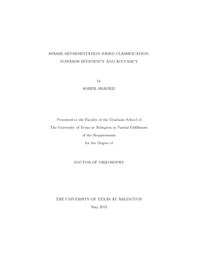
ATTENTION: The works hosted here are being migrated to a new repository that will consolidate resources, improve discoverability, and better show UTA's research impact on the global community. We will update authors as the migration progresses. Please see MavMatrix for more information.
Show simple item record
| dc.contributor.author | Shafiee, Soheil | en_US |
| dc.date.accessioned | 2015-07-31T22:10:04Z | |
| dc.date.available | 2015-07-31T22:10:04Z | |
| dc.date.submitted | January 2015 | en_US |
| dc.identifier.other | DISS-13052 | en_US |
| dc.identifier.uri | http://hdl.handle.net/10106/25025 | |
| dc.description.abstract | With the fast growing deployment of machine intelligence in several real-life applications, there are always increasing needs for faster and more precise machine learning algorithms, especially classification and object recognition. One of the most recent methods proposed for this purpose is Sparse Representation-based Classification (SRC) which works based on the emerging theory of Compressive Sensing. SRC shows excellent classification results in comparison to many well-known classification approaches. However, despite its high recognition power, SRC suffers from high computational and memory costs as it directly uses all original ground truth data as representatives to build its training model. Given high recognition rates of SRC, it becomes important to reduce the time and memory requirements of this method while preserving its accuracy. These improvements help SRC to be a more practical solution especially to be used on portable devices. This research investigates different representative reduction approaches in the SRC context on multiple heterogeneous datasets and proposes a training model to be used along with SRC by using fewer but more informative representatives for the training space. We also investigate how incorporating multiple modalities of the data helps to improve SRC outcomes by extending efficient SRC implementations to multi-modality schemes and introducing three different approaches for this purpose. Experimental results show the proposed methods not only perform faster, but they also improve the classification accuracy on different datasets. | en_US |
| dc.description.sponsorship | Kamangar, Farhad | en_US |
| dc.language.iso | en | en_US |
| dc.publisher | Computer Science & Engineering | en_US |
| dc.title | Sparse Representation Based Classification: Towards Efficiency And Accuracy | en_US |
| dc.type | Ph.D. | en_US |
| dc.contributor.committeeChair | Kamangar, Farhad | en_US |
| dc.degree.department | Computer Science & Engineering | en_US |
| dc.degree.discipline | Computer Science & Engineering | en_US |
| dc.degree.grantor | University of Texas at Arlington | en_US |
| dc.degree.level | doctoral | en_US |
| dc.degree.name | Ph.D. | en_US |
Files in this item
- Name:
- Shafiee_uta_2502D_13052.pdf
- Size:
- 3.560Mb
- Format:
- PDF
This item appears in the following Collection(s)
Show simple item record


